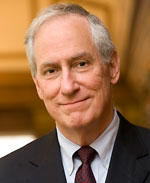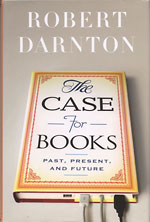Google v. Gutenberg
Robert Darnton’s new book on old books and e-books by Rebecca Rego Barry
The Google Book Search settlement may finally be on its way toward approval. On November 9, all amendments to the original (and much disputed) agreement are due to Judge Denny Chin. Authors will receive deserved royalties, and readers will have access to millions of digitized volumes. But the danger of commercialization and monopoly still alarms Robert Darnton, director of the Harvard University Library and author of the recently published The Case for Books: Past, Present, and Future.
“The settlement, in my view, has the makings of something that could be of great benefit to the country, but it requires safeguards,” Darnton said during a recent interview.
Darnton, one of the foremost book historians in the world, has been intimately acquainted with the Google digitization program since he arrived at Harvard just over two years ago. Harvard’s library was one of the first five research libraries that allowed Google to digitize its collection. At first, Darnton believed the project was promising, but the more he learned about it, the more it seemed to elevate private interests over public good. Google, he said, “would have this tremendous power over information.”
Darnton wrote two essays about these anxieties, which were published in The New York Review of Books and are reprinted in his new book. The Case for Books also includes essays on Harvard’s open access policy and the Gutenberg-e scholarly publishing project, as well as a rumination on the future of libraries that he delivered as a lecture at last month’s Frankfurt Book Fair (where, Publishers Weekly reported, there was a “subtle backlash” against digital publishing and a “rash of anti-Google sentiment”).

credit: Rick Friedman, courtesy of PublicAffairs
In the book’s introduction, Darnton admits that these essays were not “meant to fit in any prefabricated structure. They were written as occasions arose and fired off, scattershot, at moving targets.” Yet The Case for Books (also available as an e-book) is cohesive, and it puts the digital question into a useful context by examining the past. An essay from 1999 on the excessively inflated prices of scholarly journals now reads as a cautionary tale about privatizing knowledge. Another on paper preservation reminds us how re-formatting books (on microfilm) failed once before.
It’s not that Darnton eschews the great possibilities of electronic communication. He has been working on an e-book for a decade, which he describes in a chapter titled Cyberspace. “An ‘e-book’ unlike a printed codex, can contain many layers arranged in the shape of a pyramid, Readers can download the text and skim through the topmost layer…if they come upon something that especially interests them, they can click down a layer to a supplementary essay or appendix. They can continue deeper through the book, through bodies of documents, bibliography, historiography, iconography, background music…” he writes. Darnton said he plans to get much of the documentation he has collected for the e-book online in the next year and invites readers to check it out while he finishes the main text.
“Some of the material for book historians is spectacular,” he said. For example, the diary of a book salesman from 1778 is particularly exciting.
Darnton is undoubtedly a bibliophile, but one who recognizes that the printed book and the digital book must co-exist. He advocates the creation of a national digital library. But when asked about ‘bookless’ libraries, such as the Cushing Academy in Massachusetts, which recently decided to discard its 20,000-volume collection, he said he was “appalled.”
“Itís naïve to think that all information is online. It’s also naïve to think that all information is in books, either,” he said. “I see this vast world of information in many different forms, and the notion that digital is going to encompass it all is just wrong-headed.”








